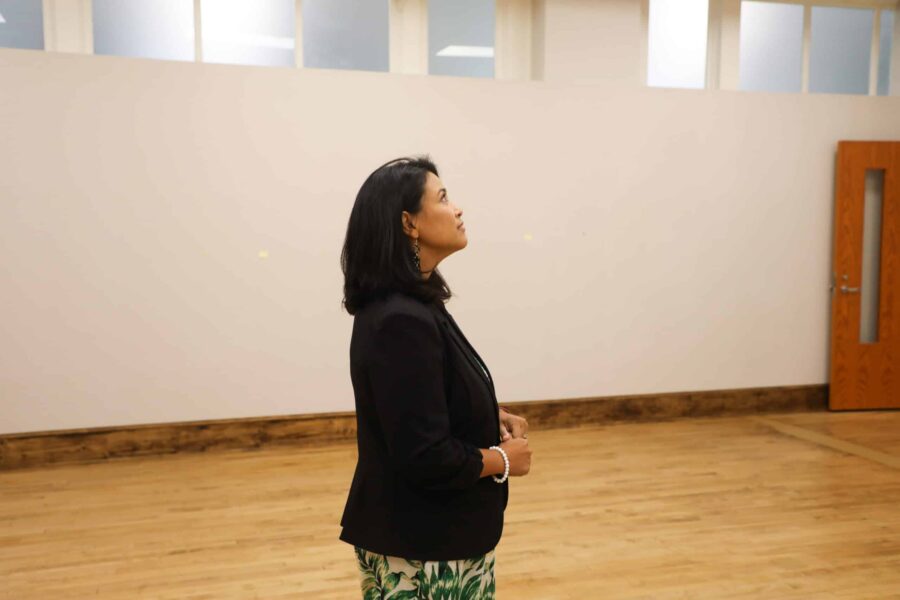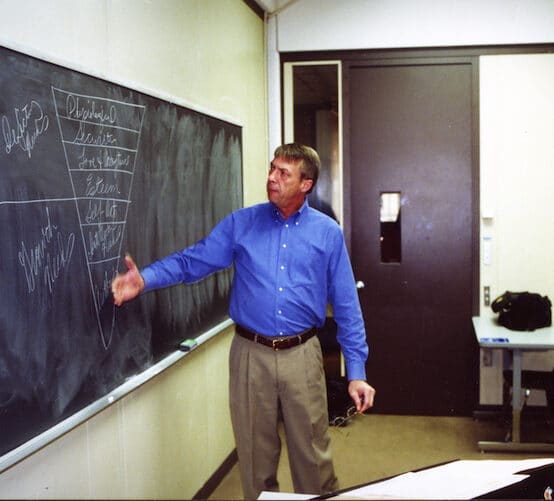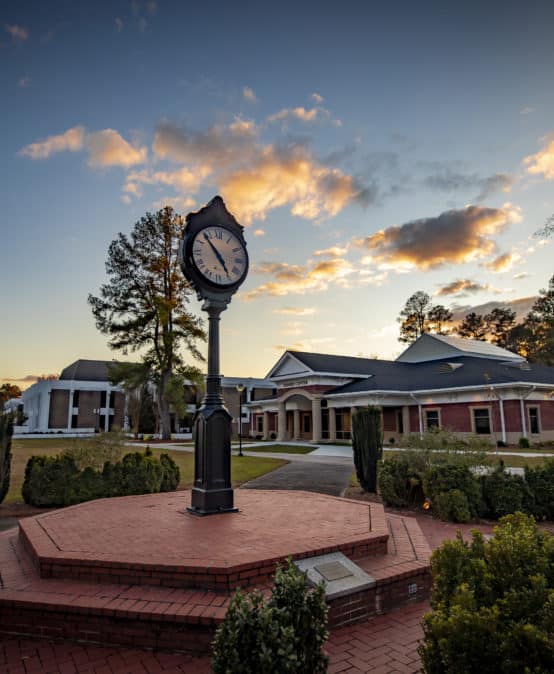November 3, 2023
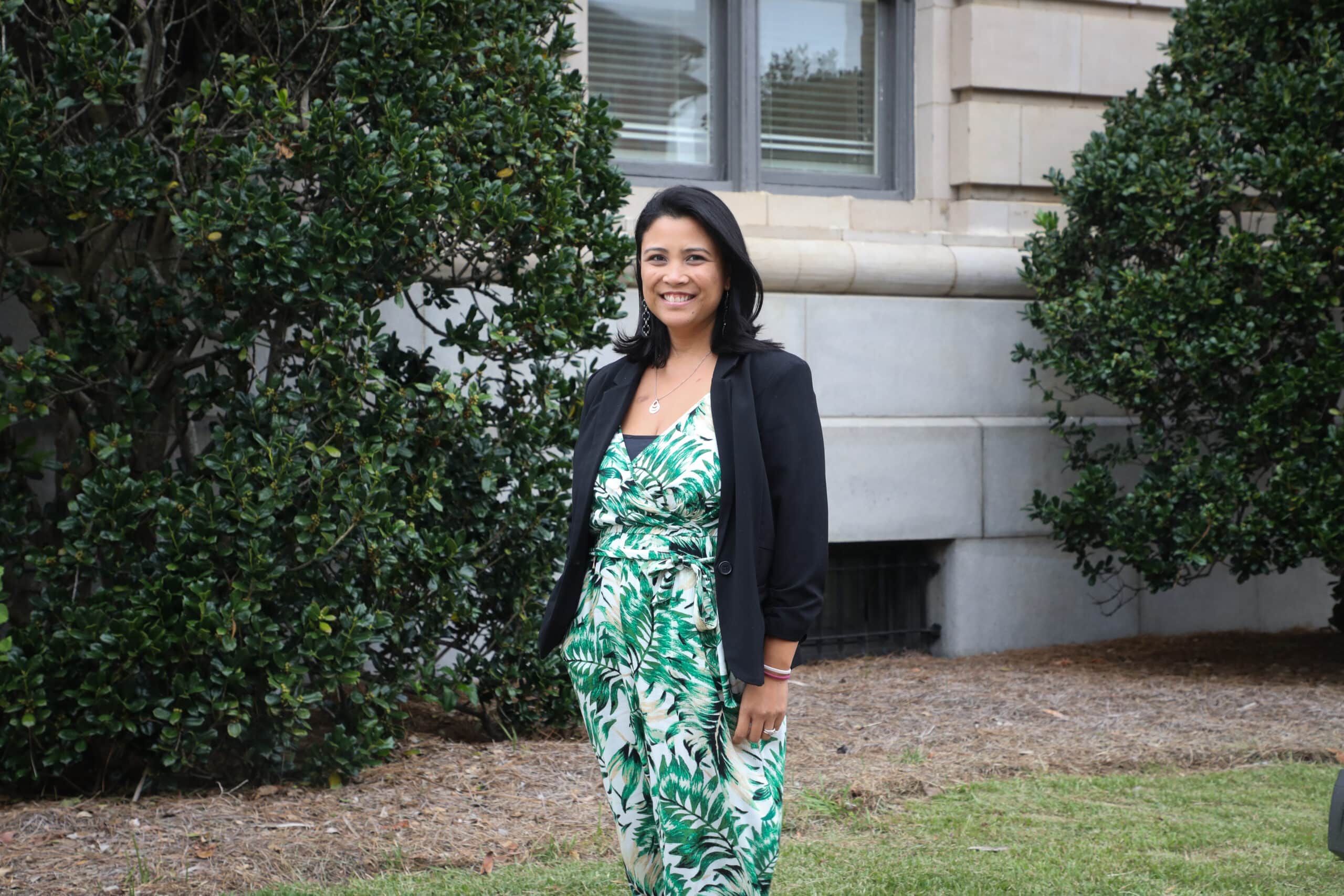
Lydell Comes ‘Home’ To Lead FMU’s OTD Program
Lydell Comes 'Home' To Lead FMU OT
By Tucker Mitchell | November 2023 | FMU Focus Magazine Fall 2023
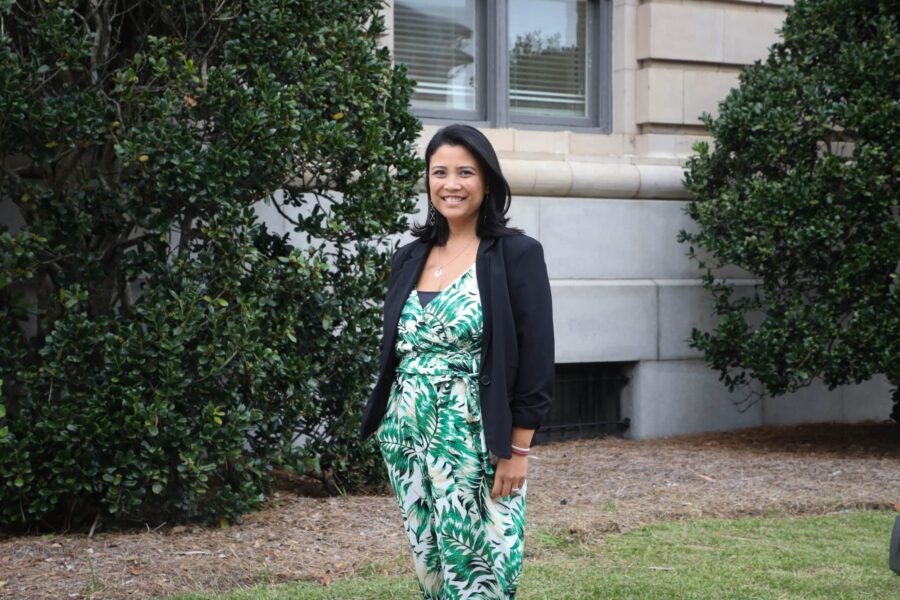
To Dr. Rachelle Lydell, Francis Marion University’s new Occupational Therapy Doctorate program feels like home.
Lydell, who was named program director for FMU’s second doctoral program last year, is returning to her professional roots to lead FMU’s program.
Lydell began her career as an Occupational Therapy practitioner in Florence more than a decade ago. It’s where she and her husband started their family, and now it’s where she’s taking her biggest career step.
Lydell, a native of Canada, shakes her head, humbled, by her unexpected path.
“It was not my plan, it was His,” says Lydell. “It’s astounding how things work themselves out. To have started my career in this community, and to be circled back at another level … I am thrilled to be able to share my passion for occupational therapy through helping educate students who will graduate and make a difference in our community.”
FMU began accepting applications for the three-year doctoral program in OT this past summer. The first cohort of 30 students will matriculate in the fall of 2024. Lydell and the program’s growing faculty will accept one cohort of 30 students each year, for a total of 90 students by 2026. The program will remain at that level as new cohorts replace graduating classes every fall.
The FMU OTD Program is a candidate for accreditation by the Accreditation Council for Occupational Therapy Education (ACOTE), a leading authority in the field. Accreditation is a system for recognizing a level of performance, integrity, and quality of educational institutions and their professional programs so that the educational community and the public they serve can have confidence in them.
The three-step accreditation process is used by ACOTE to ensure the development of quality OT programs and to provide feedback to new and developing programs prior to the admission of the first class of students. FMU will apply for ACOTE Candidacy Status in December this year. Completing accreditation after a program is already underway is typical in higher ed. ACOTE, like most accreditation bodies, wants to see the actual program in action before granting full accreditation.
First Grads in ’27
Graduation from an accredited educational program is a requirement of eligibility for certification by the National Board for Certification in Occupational Therapy and for licensure in most states. Lydell is confident that full accreditation will be granted to the OTD program prior to the graduation of the first class of students in 2027.
The university began researching occupational therapy as a potential addition to FMU’s curriculum in the fall of 2019. As has been the case with all the new programs in FMU’s expanding School of Health Sciences, university leaders were reacting to a unique combination of community need and student interest. Because of the projected need for OT, the Bureau of Labor Statistics projects jobs in the field will grow “much faster” than in most professions. The number of OT jobs are expected to grow by 12 percent in the next decade.
“In the state of South Carolina, there are only 11 entry-level OT programs: three occupational therapy doctorate programs (the long-standing program at the Medical University of South Carolina, and Presbyterian College, who just received full accreditation) and eight occupational therapy assistant programs,” says Lydell. “When you compare those numbers to a state like Florida, for example, where there are 37 entry-level programs across degrees (Associate, Baccalaureate, Master & Doctorate), it might be easy to assume that there might be a need that can be filled institutionally through higher education.
“There is a need for occupational therapy practitioners in our state and just about everywhere really,” says Lydell. “As a clinician that has worked within our community, I have a unique understanding about the need here. The need for OT was high years ago, and occupational therapy resources were minimal. With the growth in and around Florence, the number of occupational therapy practitioners available to serve the needs of the community has unfortunately not grown much. I am fortunate to still be able to connect with former colleagues and administrators all around this area, but unfortunately, they are all struggling to fulfill needs. The local school systems, for example, I know they are struggling to serve a need with minimal resources.
“When the need is high and the lack of resources affects an institution’s ability to provide appropriate care, issues can really snowball,” Lydell says. “For example, although we have a system in this area, the lack of occupational therapy resources to support early intervention delays the ability to identify and address problems early so that they are less likely to continue into the early childhood years. This inability to address barriers to normal development early, subsequently pushes the responsibility onto the school systems, which are stressed already, and it becomes harder and harder to support and meet that need.”
An example of another need area is the adult stroke population. Florence is considered part of what healthcare providers sometimes call “the stroke belt,” a region of higher stroke mortality that has persisted since around 1940. OTs play a crucial role in stroke rehabilitation, which is usually implemented in a medical setting. As with the schools’ situation, there aren’t enough practitioners available in the area.
Lydell says hospitals, school districts, and other agencies in need of occupational therapy services often employ head hunters to seek out occupational therapists and occupational therapy assistants from afar. That strategy can produce results, but it’s an expensive way to acquire talent.
“Those individuals who come from out-of-state often don’t stay,” says Lydell. “One of my primary goals is to “grow” local practitioners because they already have a unique understanding about the needs of our area.”
FMU will help the community do just that.
Doctoral Momentum
Occupational therapists can be licensed with a masters or a doctoral degree. But, mirroring many other healthcare specialties, there is a definite trend towards the OTD degree.
Some of that, says Lydell, is driven by the constantly changing healthcare system and the realities of a billing system driven by regulation. But more importantly it is the advanced knowledge and ability with which graduates holding an occupational therapy doctorate are equipped. FMU’s program in particular, has been intentionally designed to help students acquire a higher level of clinical knowledge and skill through courses that foster an entrepreneurial mindset, leadership and advocacy skills, and the ability to perform applied research.
“A graduate with a doctorate degree will be able to help move the profession forward in a number of ways,” says Lydell. “This includes the ability to apply for different roles in various settings where OTs should or can be but are not generally found. Graduates will most likely end up as leadership at some point in their careers. A doctorate degree opens up the doors to advanced-level opportunities where one’s imagination is the limit.”
Occupational therapists are tasked with helping individuals across the lifespan to enhance their ability to perform tasks associated with everyday living. This includes overseeing intervention programs that improve functional skills, or finding accommodations or adaptations to assist those with special needs. The ultimate outcome for a patient who receives OT services is to progress to a level of function where they can live and work (if appropriate) independently again.
Occupational therapy is not the same thing as physical therapy, although they are allied fields. One OT advocacy group explains the difference as “physical therapists help people to walk. Occupational therapists get them to dance!”
More Efficient
Lydell says there’s also a difference in the type of person who walks the OT career path.
“An individual who is attracted to an occupational therapy career is not necessarily lured by monetary gain, although it is a solid career from that standpoint,” says Lydell. “People tend to look towards our field because they are passionate about helping others and have often had a lived experience with a friend or a loved one who was treated by an OT. OTs can impact an individual’s life for the better and create ripple effects that are long lasting. So, they see the impact.
“What we call ‘therapeutic use of self’ — how we utilize our personality, insights, perceptions, and judgments when we interact with patients, how much meaning we can bring to the therapeutic process — is what attracts people, too,” says Lydell.
A bachelor’s degree is required to enter the OTD program at FMU. Students with a masters degree can enter, too.
Lydell says that while students typically come from academic backgrounds in the natural or life sciences, she’s already had a number of students from various disciplines inquire about the program. In her experience, applicants at FMU and within institutions across the nation come from all academic walks — which is the way it should be.
“There was one individual who inquired about our program who shared that she will be graduating with an agriculture business degree,” says Lydell. “That is not typical, but it’s great. She’ll bring a different and special perspective, knowledge and skill to the field and the program because there are certainly opportunities in that area that need the knowledge and skills of an OT — industrial rehabilitation, workers compensation and program and policy development, for example. As long as there is a need to improve the skills of living, OTs are needed everywhere.”
Collaboration and Clinics
Students in FMU’s OTD program will benefit from the university’s robust offering of healthcare fields, and recently completed facilities. Most classes will take place in downtown Florence, at the Carter Center for Health Sciences and the Leatherman Medical Complex. Renovation work is currently underway at Leatherman to create a studio apartment so that OT students can practice assisting patients with everyday living. The pseudo studio apartment will include a kitchenette, bathroom, bedroom, living room and laundry room. The space will also include a dedicated area to address vocational rehabilitation.
Students in the occupational therapy program will have the opportunity to collaborate with students from across FMU. Plans to collaborate with FMU’s Speech-Language Pathology Program (a master’s level program) are currently underway. The two disciplines often work together with patients in the real world, so beginning those connections in the academic world makes sense, and SLP classes and labs are held in Leatherman, too.
Collaborative opportunities with other disciplines are also possible as well, especially as FMU moves towards a graduate program in physical therapy. That program is already in the planning and approval pipeline. All of that fits into the university’s long-term vision for a comprehensive School of Health Sciences with budding practitioners across many disciplines sharing space and resources, and learning together where appropriate.
Lydell hopes that OT will join the growing list of low-fee public clinics run by FMU faculty. FMU graduate students, under the supervision of university faculty, already serve psychology and speech-language pathology patients. Occupational therapy would add another needed service.
Lydell also expects students in the program to help meet local needs when they are placed in local schools, hospitals, and non-profits during their required fieldwork experiences. During their matriculation, all students are required to complete four courses of level I field work, in which they are exposed to the knowledge and skills of an OT faculty member who will spend time in a clinical setting demonstrating their skills through OT practice, ultimately educating and mentoring students in their confidence and growth. Students are also required to complete two 12-week level II fieldwork experiences, clinical internships in which students are in the field full time, under the supervision of a licensed occupational therapist. In those scenarios, students evaluate and assess patients, as well as design appropriate interventions to meet their short term and long term goals.
When they have completed their coursework and their clinical assignments, Lydell says they will be ready to provide an important service to a community where they are desperately needed.
“I love being back in Florence and being able to reconnect with some of the same people I was friends with and with whom I’ve worked with before,” says Lydell. “I’ve also enjoyed making new connections since moving back, and I feel like I have a good understanding of the needs of the people in the community and the programs that are out there. They can use the volunteers and the people. I know it will mean a lot for the community when we start graduating skilled occupational therapy practitioners.”
Lydell is a clinician of varied clinical background and an OT practitioner more than 12 years, including five years in higher education. She brings to FMU valuable experience creating and launching OT programs.
Prior to coming to FMU, she started an occupational therapy masters program at Carroll University in Waukesha, Wisconsin. Then, following some time off to battle through a personal illness, she was selected to develop and lead one of the field’s first Occupational Therapy Assistant Bachelor of Science programs at St. Andrews University (a Branch of Webber International University) in Laurinburg, N.C.
